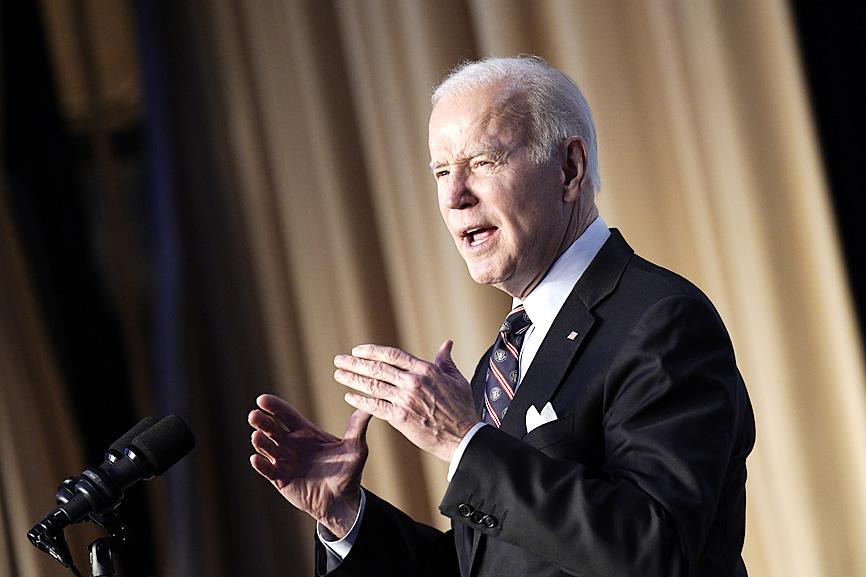US President Joe Biden was yesterday set to call for an end of normal trade relations with Russia, clearing the way for increased tariffs on Russian imports, people familiar with the matter said.
His announcement to revoke the trade privileges was to come alongside similar measures by G7 nations and EU leaders, the people said.
The president cannot unilaterally change Russia’s trade status because that authority lies with the US Congress, where Democratic and Republican lawmakers have called for the revocation.

Photo: Bloomberg
Suspending normal trade relations with the US, which other countries call “most favored nation status,” would put Russia in the company of countries such as Cuba and North Korea.
It would allow the US to hit Russia with significantly higher tariffs than it applies to other WTO members, which has as a core principle of non-discrimination among members and treating all members equally.
Just like the US, the other countries calling for the repeal over Russia’s invasion of Ukraine go through their own processes, the people said.
Russia is far more dependent on the EU than the US, selling about one-third of its exports to the bloc, versus just 5 percent to the US in 2020, IMF data showed.
The EU last week said that it was seeking to remove Russia’s most-favored nation status, and Canada withdrew the designation from Russia.
Leaders in the US House of Representatives and Senate have pushed for the repeal of preferential trade relations, but earlier this week, the provision was removed from a bill banning Russian energy imports.
Lawmakers criticized the White House for asking that the provision be struck as talks with allies were ongoing.
On Thursday night, US Senator Rob Portman said that he has a bill with US Senator Ben Cardin to revoke Russia’s trade status, adding that it is important that Biden also has allies following suit.
“It’s much more effective if they all do it,” Portman said in an interview at the Capitol. “For us it’s not a big deal, but for Europe it’s huge, and it’s the right thing to do. Access to our market is a privilege, not a right.”
The UK yesterday slapped a fresh wave of sanctions on Moscow, targeting 386 members of Russia’s parliament who supported Russian President Vladimir Putin’s invasion of Ukraine.
The new sanctions against members of the Duma ban them from traveling to the UK, as well as accessing any assets they hold in Britain.
The lawmakers were sanctioned after they voted last month to recognize the breakaway republics of Lugansk and Donetsk in eastern Ukraine, providing a pretext for the war, the British Foreign, Commonwealth and Development Office said.
“We’re targeting those complicit in Putin’s illegal invasion of Ukraine and those who support this barbaric war,” British Secretary of State for Foreign, Commonwealth and Development Affairs Liz Truss said.
“We will not let up the pressure and will continue to tighten the screw on the Russian economy through sanctions,” she said.
Additional reporting by Reuters

INVESTIGATION: The case is the latest instance of a DPP figure being implicated in an espionage network accused of allegedly leaking information to Chinese intelligence Democratic Progressive Party (DPP) member Ho Jen-chieh (何仁傑) was detained and held incommunicado yesterday on suspicion of spying for China during his tenure as assistant to then-minister of foreign affairs Joseph Wu (吳釗燮). The Taipei District Prosecutors’ Office said Ho was implicated during its investigation into alleged spying activities by former Presidential Office consultant Wu Shang-yu (吳尚雨). Prosecutors said there is reason to believe Ho breached the National Security Act (國家安全法) by leaking classified Ministry of Foreign Affairs information to Chinese intelligence. Following interrogation, prosecutors petitioned the Taipei District Court to detain Ho, citing concerns over potential collusion or tampering of evidence. The

‘FORM OF PROTEST’: The German Institute Taipei said it was ‘shocked’ to see Nazi symbolism used in connection with political aims as it condemned the incident Sung Chien-liang (宋建樑), who led efforts to recall Democratic Progressive Party (DPP) Legislator Lee Kun-cheng (李坤城), was released on bail of NT$80,000 yesterday amid an outcry over a Nazi armband he wore to questioning the night before. Sung arrived at the New Taipei City District Prosecutors’ Office for questioning in a recall petition forgery case on Tuesday night wearing a red armband bearing a swastika, carrying a copy of Adolf Hitler’s Mein Kampf and giving a Nazi salute. Sung left the building at 1:15am without the armband and apparently covering the book with a coat. This is a serious international scandal and Chinese

Seventy percent of middle and elementary schools now conduct English classes entirely in English, the Ministry of Education said, as it encourages schools nationwide to adopt this practice Minister of Education (MOE) Cheng Ying-yao (鄭英耀) is scheduled to present a report on the government’s bilingual education policy to the Legislative Yuan’s Education and Culture Committee today. The report would outline strategies aimed at expanding access to education, reducing regional disparities and improving talent cultivation. Implementation of bilingual education policies has varied across local governments, occasionally drawing public criticism. For example, some schools have required teachers of non-English subjects to pass English proficiency

TRADE: The premier pledged safeguards on ‘Made in Taiwan’ labeling, anti-dumping measures and stricter export controls to strengthen its position in trade talks Products labeled “made in Taiwan” must be genuinely made in Taiwan, Premier Cho Jung-tai (卓榮泰) said yesterday, vowing to enforce strict safeguards against “origin laundering” and initiate anti-dumping investigations to prevent China dumping its products in Taiwan. Cho made the remarks in a discussion session with representatives from industries in Kaohsiung. In response to the US government’s recent announcement of “reciprocal” tariffs on its trading partners, President William Lai (賴清德) and Cho last week began a series of consultations with industry leaders nationwide to gather feedback and address concerns. Taiwanese and US officials held a videoconference on Friday evening to discuss the